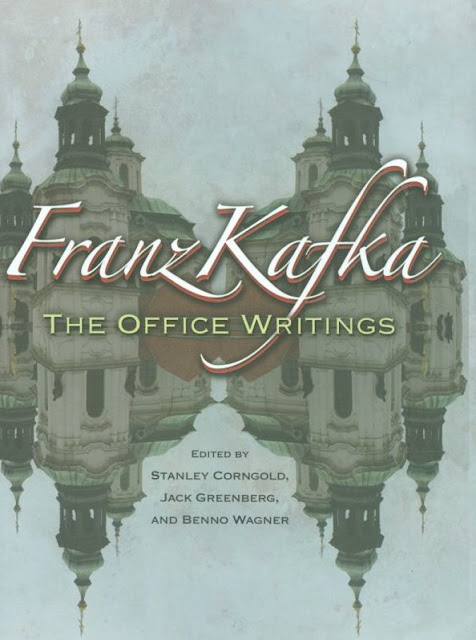A new collection of writings from Kafka's work for an insurance company

'Days passed in futility, powers wasting away in waiting, and, in spite of all this idleness, throbbing, gnawing pains in my head.'
Franz Kafka's diaries, Friday 19 November 1915
It's easy to see how Kafka fans can become frustrated. On the one hand, he's produced an impressive body of work. On the other, it's surprisingly brief, and very little was published during his lifetime. His professional career developed within an insurance company in Prague, where Kafka worked as a bureaucratic functionary of sorts. His writing life was largely a private one, snatched in moments late at night when he could find time for himself.
It's difficult to tell whether any of the work published since his death in 1924 was how the writer would have intended, as many of the novels and short stories were extensively edited and rearranged by his literary executor, Max Brod.
Brod was the best friend of Kafka since their days at university, and was entrusted with all of his notebooks at the time of his death. Kafka requested that these papers be burnt, but Brod took it upon himself to publish them regardless, seeing their literary potential. As a result, we have at our disposal almost all that Kafka ever put to paper. Publications include fragments of novels, shorter works, diary entries, and even personal love letters tracing the history of his long-term relationships - all made available for the benefit of lofty academic criticism, and curious readers such as myself. As a result, this brilliant and fascinating collection of work comes complete with a sense of heavy, voyeuristic guilt.
And to add to this burden of guilt, an additional collection of his writings has been released. This time, instead of a new translation of The Trial, or a short story that has never been seen before, we have his Office Writings brought together in one volume for the first time. To me, this seems to add an entirely new, almost absurd, element to our understanding of Kafka's writing.
The distinction between a writer's life and his work becomes blurred and fragmented in this latest volume, where an argument is made that the two are in some ways inseparable. There is a strong suggestion in Franz Kafka: The Office Writings that his work as a bureaucratic insurance advocate can somehow broaden and expand our understanding of characters such as Joseph K. or Gregor Samsa.

Among Kafka's 'work' (in the day-job sense) are reports on 'Fixed Rate Insurance Premiums for Small Firms Using Machinery (1909)' and 'Measures for Preventing Accidents from Wood-Planing Machines (1910)'. Both sound fascinating, and come complete with a critical commentary from the editors of the collection. But while taking a peek at the realities of Kafka's office existence could be interesting, it lacks the magic and the charm of its artistic manifestations. An office report, after all, can only be so exciting; and when compared to the lustre of Kafka's prose, the reports are by their very nature dry and functional.
I must admit, I am fascinated by what Kafka might have written during his time at the Worker's Accident Insurance Institute for the Kingdom of Bohemia. I think it would provide certain insights not only into the day-to-day life of one of literature's most important writers, but also act as a slice-of-life of the early twentieth-century working classes. But I do feel a certain amount of discomfort about it all. Not only have I read the diaries, perused the love-letters, but now I catch myself rifling through Kafka's office desk drawers. Whatever next? Is nothing sacred?
Ultimately, however, I know that these endless forays into a writer's personal and private life will end in anti-climax. Albert Camus once said that the greatness of The Trial rested on the fact that it "offers everything and confirms nothing". Camus has spotted a powerful quality that tempts us toward the book time and again in search of answers; the book can entice us towards its writer's private life for clues to concrete origins and meanings. But Kafka's private life, and his work at the Insurance Institute, bears a similarly frustrating mark: it offers readers everything, but confirms nothing. And I suspect that's how things shall remain.


